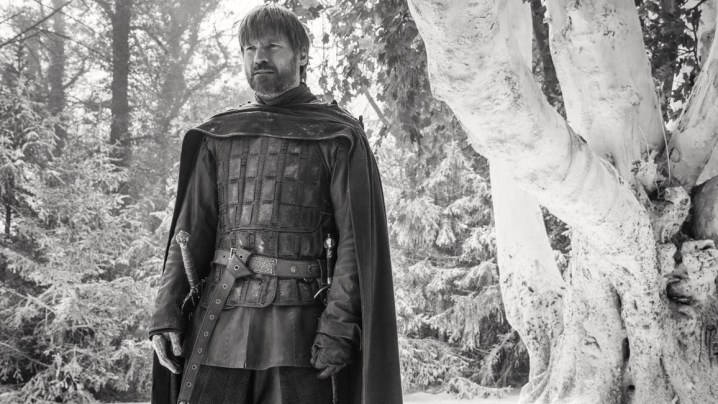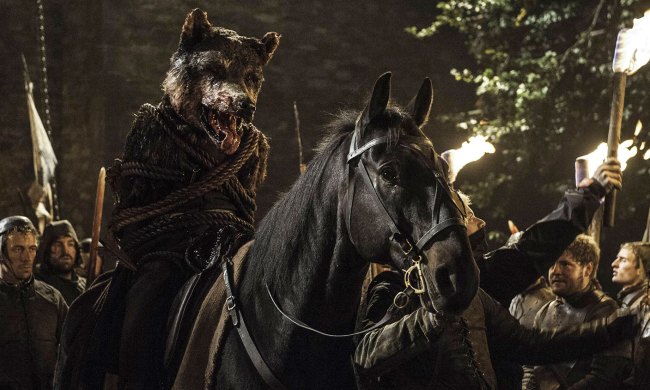
More Game of Thrones
- Why Daenerys shouldn’t be queen
- Plots that differed from the books
- What we know about the upcoming prequel
(Editor’s note: The remaining words contain spoilers, lamentation, and general angsty musings regarding Game of Thrones’ latest episode. Read on at your own risk.)
Take the opening for example, in which Varys, the greatest spymaster in Westeros, tries to rope Jon into usurping Daenerys’ throne while out in the open. The conversation goes something like this:
Varys: Hello, sir, I would like to commit treason.
Jon: What? But that would be treason.
Varys: That’s right. One treason, please.
Jon: You know I’ve slept with Daenerys, and am constantly voicing my support for her claim to the throne?
Varys: That makes you the perfect man for treason!
Jon: Tyrion is literally watching this conversation. He’s not even hiding.
Varys: Alright, well I’m off to print some “Jon Snow for king” T-shirts. See ya later, treason buddy.
Having expressed his desire to betray Daenerys to two of her closest allies, Varys naturally ends up executed. The whole episode was full of bizarre character moments like this. Despite the lengths the show went to building her up as a cunning antagonist, Cersei had no tricks up her sleeves for the last stand in King’s Landing, just a whole bunch of scorpions that suddenly can’t hit the broad side of the Wall.

The most controversial decision, at least on social media, was the moment in which, the Lannister army having surrendered, Daenerys doesn’t cease her attack, bathing the city in flames with no regard for civilian life. It was a shocking moment for the denizens of Twitter, many of whom looked to Dany as a symbol of female empowerment, but while her descent into villainy was a bit rapid (blame the shorter episode counts for seasons 7 and 8), it actually makes sense given the broad strokes of her story. This is a character who has had a single-minded focus on building her empire and reclaiming her family throne, and has burned, crucified, and otherwise annihilated pretty much everyone who opposed her.
Daenerys is essentially the Genghis Khan of GoT: Lots of progressive policy ideas, but horrifying consequences at the very hint of disrespect. Viewers shouldn’t be appalled from her heel turn — especially when the truly awful character assassination happened to one Jaime Lannister.
A Lannister paid his debts?
If George R. R. Martin’s vision for the story was to tell a fantasy story in a world of moral ambiguities and realpolitik, then Jaime was a poster child for the series’ themes. As a young man, he joins the Kingsguard, only to learn that the white armor is a veneer, as the knights of the Kingsguard protect the Mad King Aerys despite his atrocities. He ends up killing Aerys, betraying his vows, when he learns the king plans to detonate wildfire caches all over King’s Landing.
By the time Game of Thrones begins, Jaime is jaded and kind of evil, going so far as to casually push a young boy out a window to keep his affair with Cersei a secret. Over the course of the series, however, especially after losing his hand (ending his status as one of the greatest sword fighters in the realm) and traveling with Brienne (who still has the idealistic vision of knighthood Jaime lost long ago), Jaime begins to reflect on his misdeeds, and even to change. He starts to view Cersei’s behavior differently, eventually leaving her after she goes back on her pledge to join the fight against the White Walkers. He even hooks up with Brienne, finally having sex with someone who isn’t his sister. Now that’s redemption!
When Jaime left Brienne to ride back to King’s Landing, it seemed so simple. The logical argument, giving his character’s redemption arc, was that he might be heading there to kill Cersei, saving the people of the city from yet another mad monarch. Instead, The Bells reveals that no, Jaime was actually still in love with Cersei and wanted to help her escape, the two of them dying as the Red Keep collapses above them.

He doesn’t even get much to do in his ostensibly final episode. Jaime spends most of his screen time running around King’s Landing, waving his golden hand at Lannister guards trying to get their attention, before he eventually runs into Euron Greyjoy.
Aside from talking about his desire to “fuck the queen,” Euron’s only role on the show is to trim various plot points with his magical ability to be anywhere and kill anyone the plot requires, even a dragon. He wants a crack at the Kingslayer, even landing a couple grievous wounds before Jaime runs him through — although, indignity of indignities, Euron doesn’t even mind, dying with a smile on his face as he thinks about landing a lethal blow on the Kingslayer.
Perhaps, if the show had taken a bit more time to tell the last stretch of the story, we might have gotten a better sense that Jaime, despite all his decisions in late season 7 and early 8, just couldn’t quit Cersei. As it stands, the end of his story leaves a feeling of whiplash, a sloppy finale for one of the story’s most fascinating characters.


